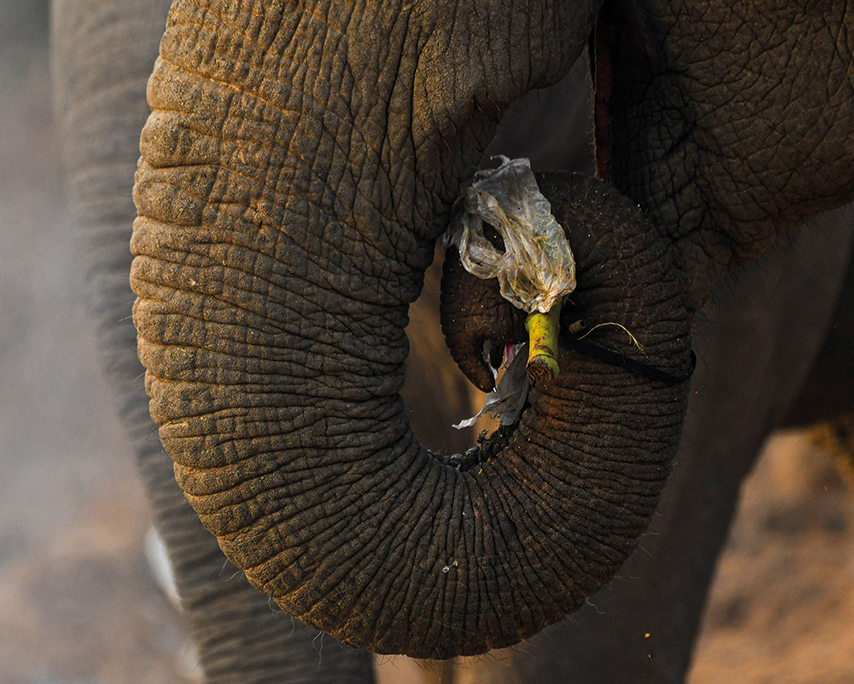A wild elephant feeds on food waste, including a polythene bag, in 6th September 2025, highlighting the dangers of human waste to wildlife.
Photo Credit: Krishan Kariyawasam/NurPhoto via Getty Images
International Day of Awareness of Food Loss and Waste
The true cost of food loss and waste
When food is lost or wasted, it is not only the meal that disappears; it is also the resources that were invested in it. All the resources that went into producing it, including water, land, energy, labour, and capital, are also lost. In a world where natural resources are under growing strain and millions continue to face food insecurity, this hidden cost deserves closer attention.
Food loss and waste are often discussed in terms of consumer behaviour: the groceries left to rot in refrigerators, the portions discarded from restaurants, or the leftovers thrown away after celebrations. While these examples matter, they only tell part of the story. In Africa, a significant share of food loss occurs much earlier in the supply chain, during production, storage, processing, and transport.
Smallholder farmers, who make up the bulk of Africa’s agricultural sector, often lose crops due to inadequate storage facilities, limited access to cold chains, or poor roads that delay transportation to markets. Tomatoes may rot on the way to urban centres, milk may spoil without refrigeration, and grain may be infested because of inadequate silos. The losses here are not the result of careless consumers, but of systemic challenges in infrastructure and market access.
From an environmental perspective, the consequences are severe. Agriculture is the largest user of water globally, and in Africa, it accounts for the majority of freshwater withdrawals. When food is wasted, so too is the water used to grow it. The same applies to land and energy. Clearing land, planting, harvesting, and transporting food all consume energy and resources. If the food never gets eaten, the environmental burden has no return.
This loss is particularly troubling on a continent already vulnerable to the effects of climate change. Degraded soils, unpredictable rainfall, and deforestation place pressure on ecosystems. Allowing food to go to waste adds yet another layer of strain. Reducing waste, therefore, is not only a matter of efficiency but also a climate adaptation strategy.
Economically, food loss undermines both household and national resilience. For farmers, wasted crops translate into lost income. For governments, food waste means more money spent on imports to cover shortfalls that could have been avoided. For consumers, it contributes to higher food prices, as supply chains pass on inefficiencies.
Socially, the paradox is striking. Millions of Africans remain food insecure, with children facing stunting and malnutrition. The fact that food is lost in some parts of the system while others go hungry highlights the deep inequities in distribution. Addressing food loss and waste could provide a meaningful step toward reducing hunger without requiring significant expansion of agricultural land.
Addressing this challenge requires coordinated action at multiple levels. Policymakers have a central role in strengthening food systems. Their role includes investing in infrastructure such as cold storage, better roads, and efficient transport networks; supporting research into preservation technologies; and creating incentives for reducing post-harvest losses.
There is also a role for sharing data and information. Many African countries still lack comprehensive statistics on the location and causes of food loss, making it difficult to target interventions effectively. Strengthening cross-border data systems would help countries learn from one another and share successful approaches.
Ultimately, the issue of food loss and waste is bigger than agriculture. It touches on environmental sustainability, economic development, and social equity. Every grain saved is not just a meal preserved but also water, labour, land, and capital protected. It is a step toward more resilient communities and a more sustainable future. Although reducing food loss and waste alone will not solve Africa’s food security challenges, it offers one of the most direct and achievable steps forward. It is about using what we already have more wisely, respecting the effort and resources that go into every harvest, and ensuring that food fulfils its most basic purpose, which is to nourish people, not to be thrown away.



